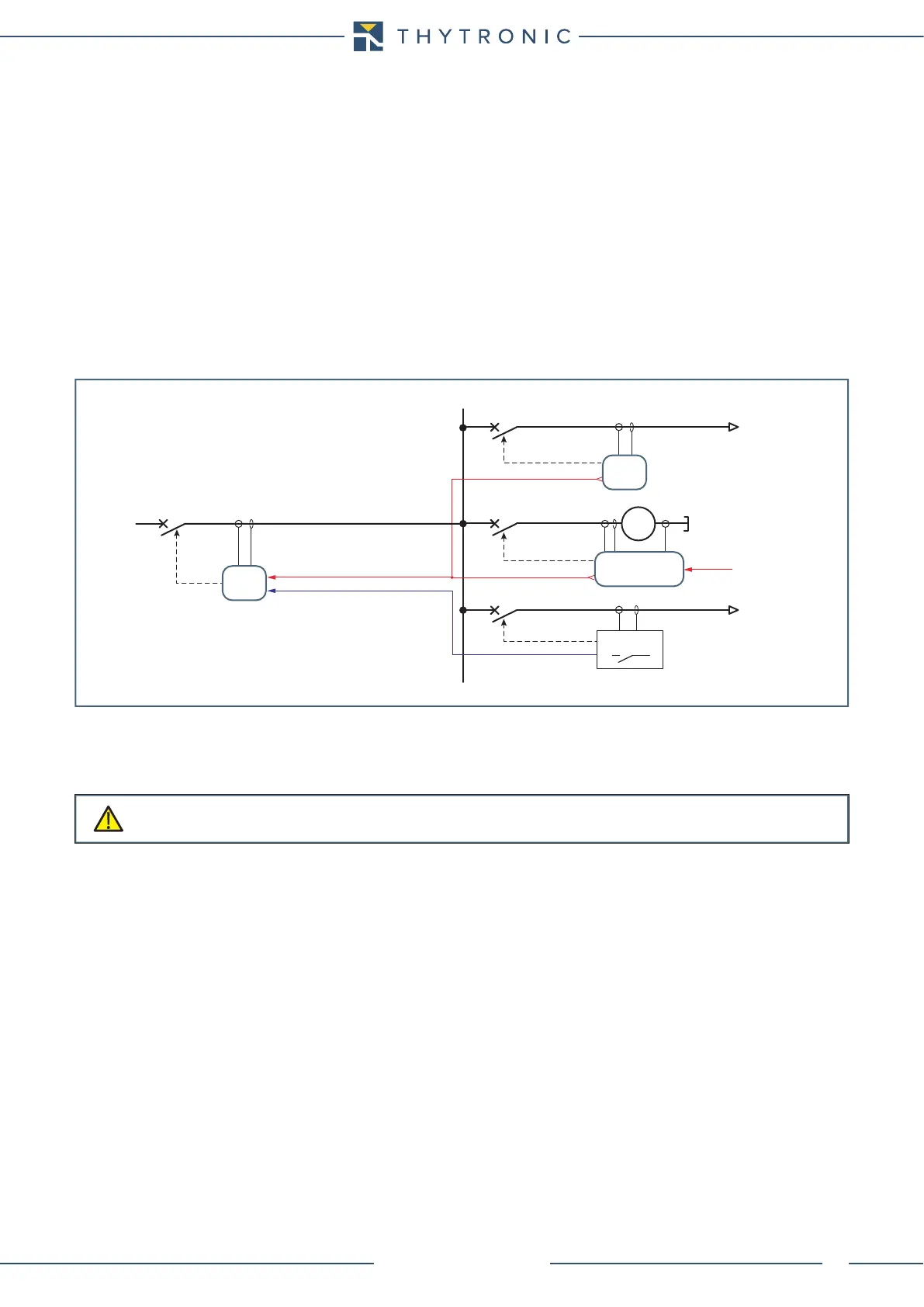FUNCTION CHARACTERISTICS
74
NG10 - Manual - 04 - 2022
Selective block -BLOCK2
Preface
The logic selectivity function has been developed to the purpose to reduce the clearing times for
faults closes to the source.
The output blocking circuits of one or several Pro_N relays, shunted together, must be connected
to the input blocking circuit of the protection relay, which is installed upwards in the electric plant.
The output circuit works as a simple contact, whose condition is detected by the input circuit of the
upwards protection relay.
The logic selectivity function can be realized through any combination of the following I/O circuits:
• One committed pilot wire input BLIN1...ON Iph, ON...Iph/IE, ON...IE.
• One committed pilot wire output BLOUT1...ON Iph, ON...Iph/IE, ON...IE.
• One or more than one independent binary inputs programmed with Block2Iph, Block2Iph/IE
or Block2IE.
• One or more than one independent output relays programmed with BLK2OUT-Iph-K, BLK2OUT-
Iph/IE-K or BLK2OUT-IE-K.
In reference to the following schematic diagram, the some protection functions of the relay placed
on the feeder may be blocked by downstream protective relays.
Input selective block
Use of committed pilot wire input BLIN1
The input is a polarized wet type powered by internal isolated supply; it must be drive by an output
block signal coming from a Pro-N device or by a free voltage contact.
The protection is blocked off according the selectivity block criteria by phase elements (Block2
Iph), by earth elements (Block2IE) or by any protection element (Block2Iph/IE) when the input
BLIN1 is active. The information about phase or phase+earth block may be select programming the
ModeBLIN1 parameter inside the Set \ Profile A(or B) \ Selective block-BLOCK2 \ Selective block
IN menus.
Use of binary inputs
If the xxBLK2IN parameters (enable) are set to ON and a binary input is designed for selective
block (Block2), the protection is blocked off by phase elements (Block2 Iph), by earth elements
(Block2IE) or by any protection element (Block2Iph/IE), according the selectivity block criteria,
when the input (IN1 and/or INx) is active.
The Block2Iph,Block2IEandBlock2Iph/IE matching must be assigned to the selected binary
inputs inside the Set \ Inputs \ Binary input 1 and Set \ Inputs \ Binary input x menus.
When a binary input is programmed for selective block input, the IN1 tON, INx tON, IN1 tOFF and
INx tOFF time delays must be reset to zero; the Logic parameters (ON/OFF) must be programmed
in the same way of the related output relay connected with-it.
Operation
For any protective element, three main conditions can arise:
A) Start = OFF: the element is at rest (no trip) regardless of the input/output blocks.
B) Start = ON: the element trips if no selective block input becomes active during the operate time.
C) Start = ON: if the selective block input (BLIN1 and/or binary input) becomes active, the element
goes in selective block state wherein the operate timer is forced to reset, so the element cannot
trip. After an adjustable time t
B-Iph
(common for phase protection elements) or t
B-IE
(common for
earth protection elements), the selective block input is disregarded and the operate timer can
start again. Information about t
B-Iph
and or t
B-IE
expired is available for reading (tBtimeout data
NG10
G
Pro_N
Pro_N
logica_acc.ai
Logic selectivity
BLIN1
BLK2OUT-Iph-K
INx=Blocco selettivo Iph
BLOUT1
BLOUT1
TRIP
TRIP
TRIP
TRIP
Any device
BLIN1
Never connect power to the block input circuit; the electronic circuit can be demaged !
WARNING

